Sanne Vrijenhoek
Diversity of What? On the Different Conceptualizations of Diversity in Recommender Systems
May 03, 2024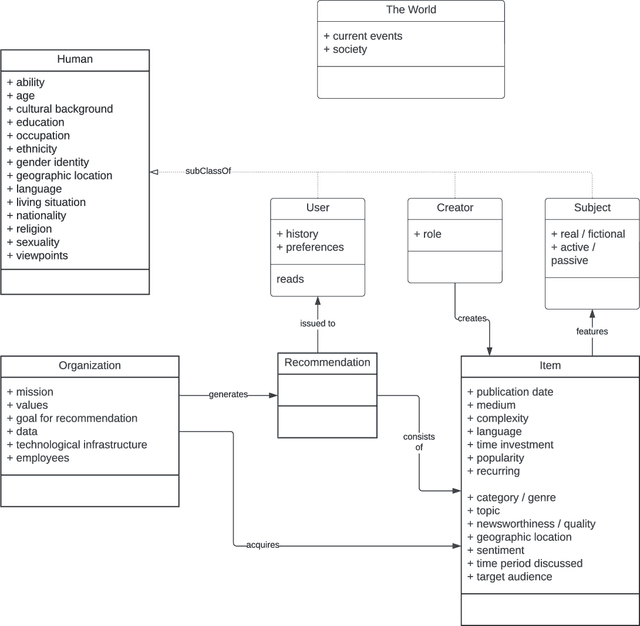
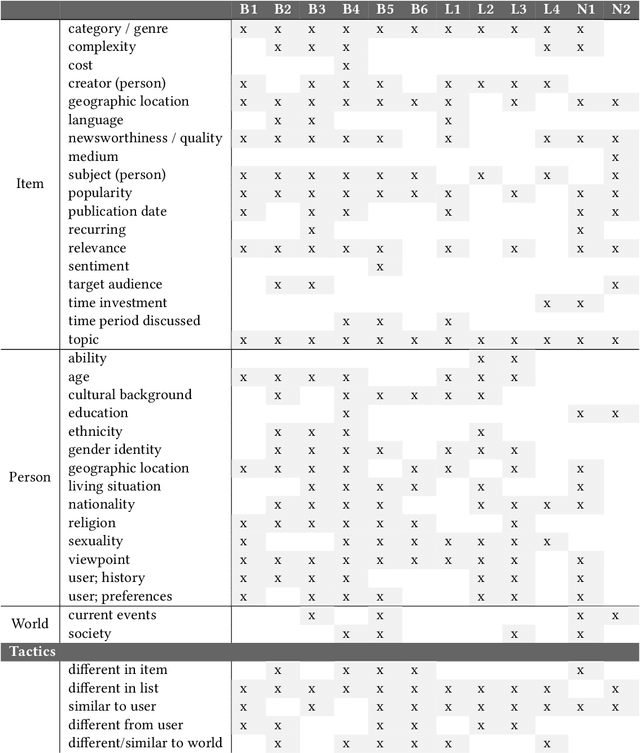
Abstract:Diversity is a commonly known principle in the design of recommender systems, but also ambiguous in its conceptualization. Through semi-structured interviews we explore how practitioners at three different public service media organizations in the Netherlands conceptualize diversity within the scope of their recommender systems. We provide an overview of the goals that they have with diversity in their systems, which aspects are relevant, and how recommendations should be diversified. We show that even within this limited domain, conceptualization of diversity greatly varies, and argue that it is unlikely that a standardized conceptualization will be achieved. Instead, we should focus on effective communication of what diversity in this particular system means, thus allowing for operationalizations of diversity that are capable of expressing the nuances and requirements of that particular domain.
Improving and Evaluating the Detection of Fragmentation in News Recommendations with the Clustering of News Story Chains
Sep 18, 2023


Abstract:News recommender systems play an increasingly influential role in shaping information access within democratic societies. However, tailoring recommendations to users' specific interests can result in the divergence of information streams. Fragmented access to information poses challenges to the integrity of the public sphere, thereby influencing democracy and public discourse. The Fragmentation metric quantifies the degree of fragmentation of information streams in news recommendations. Accurate measurement of this metric requires the application of Natural Language Processing (NLP) to identify distinct news events, stories, or timelines. This paper presents an extensive investigation of various approaches for quantifying Fragmentation in news recommendations. These approaches are evaluated both intrinsically, by measuring performance on news story clustering, and extrinsically, by assessing the Fragmentation scores of different simulated news recommender scenarios. Our findings demonstrate that agglomerative hierarchical clustering coupled with SentenceBERT text representation is substantially better at detecting Fragmentation than earlier implementations. Additionally, the analysis of simulated scenarios yields valuable insights and recommendations for stakeholders concerning the measurement and interpretation of Fragmentation.
* Cite published version: Polimeno et. al., Improving and Evaluating the Detection of Fragmentation in News Recommendations with the Clustering of News Story Chains, NORMalize 2023: The First Workshop on the Normative Design and Evaluation of Recommender Systems, September 19, 2023, co-located with the ACM Conference on Recommender Systems 2023 (RecSys 2023), Singapore
Do you MIND? Reflections on the MIND dataset for research on diversity in news recommendations
May 03, 2023
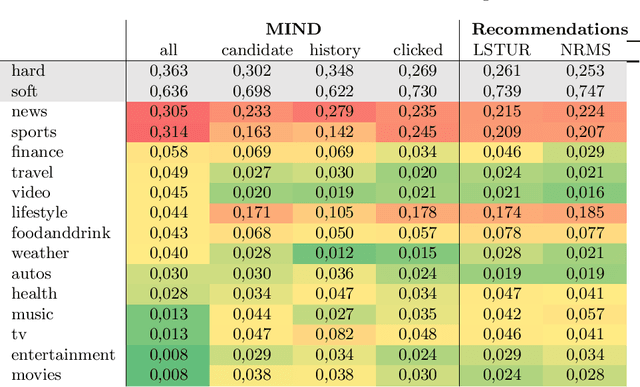
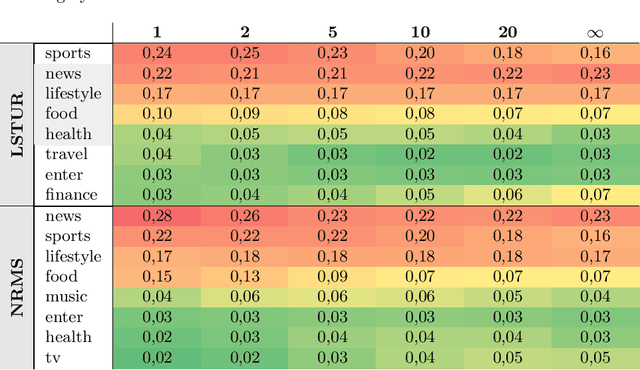
Abstract:The MIND dataset is at the moment of writing the most extensive dataset available for the research and development of news recommender systems. This work analyzes the suitability of the dataset for research on diverse news recommendations. On the one hand we analyze the effect the different steps in the recommendation pipeline have on the distribution of article categories, and on the other hand we check whether the supplied data would be sufficient for more sophisticated diversity analysis. We conclude that while MIND is a great step forward, there is still a lot of room for improvement.
RADio -- Rank-Aware Divergence Metrics to Measure Normative Diversity in News Recommendations
Sep 17, 2022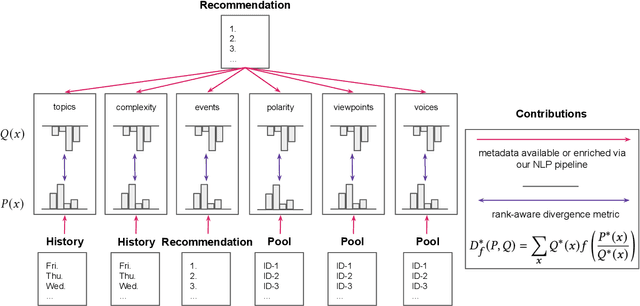

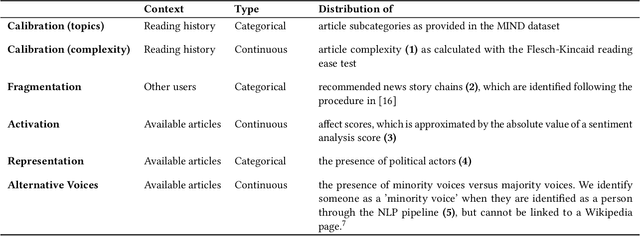

Abstract:In traditional recommender system literature, diversity is often seen as the opposite of similarity, and typically defined as the distance between identified topics, categories or word models. However, this is not expressive of the social science's interpretation of diversity, which accounts for a news organization's norms and values and which we here refer to as normative diversity. We introduce RADio, a versatile metrics framework to evaluate recommendations according to these normative goals. RADio introduces a rank-aware Jensen Shannon (JS) divergence. This combination accounts for (i) a user's decreasing propensity to observe items further down a list and (ii) full distributional shifts as opposed to point estimates. We evaluate RADio's ability to reflect five normative concepts in news recommendations on the Microsoft News Dataset and six (neural) recommendation algorithms, with the help of our metadata enrichment pipeline. We find that RADio provides insightful estimates that can potentially be used to inform news recommender system design.
Building Human Values into Recommender Systems: An Interdisciplinary Synthesis
Jul 20, 2022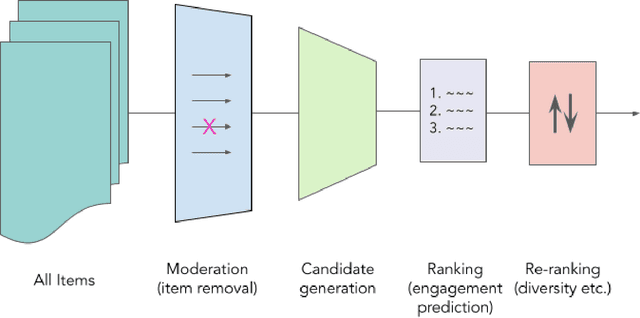
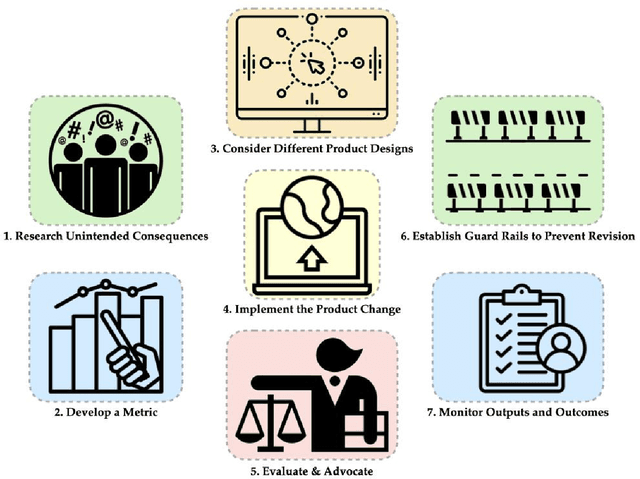
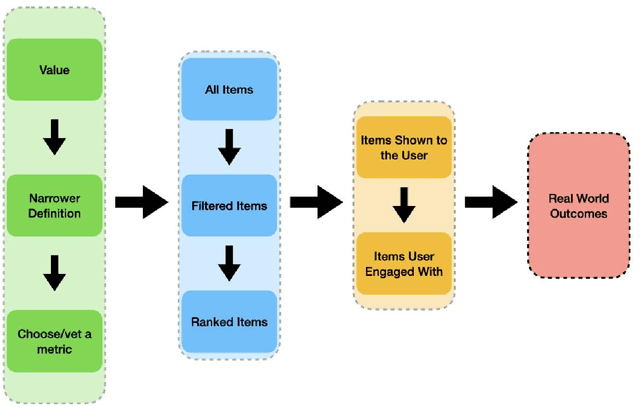

Abstract:Recommender systems are the algorithms which select, filter, and personalize content across many of the worlds largest platforms and apps. As such, their positive and negative effects on individuals and on societies have been extensively theorized and studied. Our overarching question is how to ensure that recommender systems enact the values of the individuals and societies that they serve. Addressing this question in a principled fashion requires technical knowledge of recommender design and operation, and also critically depends on insights from diverse fields including social science, ethics, economics, psychology, policy and law. This paper is a multidisciplinary effort to synthesize theory and practice from different perspectives, with the goal of providing a shared language, articulating current design approaches, and identifying open problems. It is not a comprehensive survey of this large space, but a set of highlights identified by our diverse author cohort. We collect a set of values that seem most relevant to recommender systems operating across different domains, then examine them from the perspectives of current industry practice, measurement, product design, and policy approaches. Important open problems include multi-stakeholder processes for defining values and resolving trade-offs, better values-driven measurements, recommender controls that people use, non-behavioral algorithmic feedback, optimization for long-term outcomes, causal inference of recommender effects, academic-industry research collaborations, and interdisciplinary policy-making.
 Add to Chrome
Add to Chrome Add to Firefox
Add to Firefox Add to Edge
Add to Edge